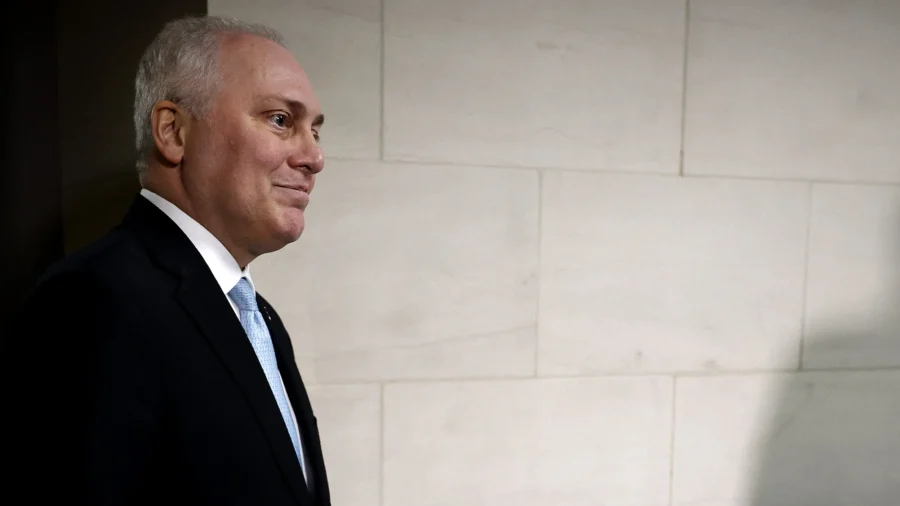Majority Leader Steve Scalise (R-La.) was nominated for speaker of the House by the Republican conference at 1:00 p.m. Oct. 11, defeating Judiciary Committee Chairman Jim Jordan (R-Ohio) 113–98.
Mr. Scalise is expected to face Minority Leader Hakeem Jeffries (D-N.Y.) in an election by the full House scheduled for 3:00 p.m. the same day.
With 217 votes needed to win, there is no guarantee that Mr. Scalise will be successful on the first ballot in the House—or at all. Some supporters of Mr. Jordan have vowed to keep fighting for his election, threatening a repeat of the drawn-out contest in January, in which Rep. Kevin McCarthy was elected after a contentious battle among Republicans lasting four days.
Neither candidate appeared to have the upper hand after a closed-door Republican meeting the previous day.
“A lot of people like Steve and a lot of people like Jim,” Rep. Troy Nehls (R-Texas) said afterward. “I don’t know how you get to 218,” meaning the number of votes needed to win in the House. Due to a pair of vacant seats in the House, the number is now 217.
Members arrived for the conference vote expecting a long ordeal. “Brick the doors up, I’m ready to stay all day,” Rep. Tim Burchett (R-Tenn.) said before entering the conference room.
Despite the anticipated slog, Mr. Scalise prevailed on the first ballot, aided in part by the defeat of a proposed amendment to the rules that could have given Mr. Jordan an edge.
Rule Change Tabled
Also on the GOP conference agenda are possible rule changes aimed at avoiding further public displays of infighting.
The previous speaker, Rep. Kevin McCarthy (R-Calif.) was elected in January after 15 rounds of balloting, and only after making unspecified promises to a number of holdout Republicans.
He was ousted by a motion to vacate the chair filed by Rep. Matt Gaetz (R-Fla.) and supported by seven other GOP members—plus 208 Democrats.
Rep. Chip Roy (R-Texas) proposed an amendment to the conference rules requiring any candidate to gain 217 votes among the 221 members of the Republican conference before being presented to the full House.
That would have guaranteed a speaker’s election on one ballot in the House, avoiding further GOP infighting on the House floor.
The proposal was said to favor Mr. Jordan, whom supporters believed would draw increasing support over the multiple ballots that would likely be required to reach 217 votes.
That amendment was tabled by a vote of the conference, essentially defeating it.
“I don’t think there should be any finessing of the system that puts us in a situation we have to go behind closed doors,” Rep. Steve Womack (R-Ark.), who made the motion to table, told reporters. “I think it empowers a handful of people to stop the movement of a speaker election in its tracks.”
Scalise Confident
Mr. Scalise appeared confident heading into the conference vote, promising a speedy resolution to the vacant speakership.
“We [the House of Representatives] have got to get back to work, and today we’re going to do that,” he said just prior to the Republican conference meeting.
“Under Speaker Steve Scalise, the first order of business will be to pass a strong resolution expressing support for Israel,” Mr. Scalise said, referring to the conflict between Israel and Hamas that erupted on Oct. 7.
Mr. Scalise, 57, has served in Congress since 2008. He has risen through the ranks of House leadership since 2013 when he chaired the Republican Study Committee, the largest of the five major Republican caucuses. He moved on to majority whip and then majority leader. Mr. Scalise is known as an effective fundraiser, a key responsibility as the party’s leader in the House.
Mr. Scalise may be best known for surviving a shooting during a practice session for the annual congressional baseball game in 2017.
In August, he began treatment for multiple myeloma, a blood cancer. He announced on Sept. 27 that the cancer had “dropped dramatically.”
“I have a proven track record of bringing together the diverse array of viewpoints within our Conference to build consensus where others thought it impossible,” Mr. Scalise wrote in a letter to colleagues announcing his candidacy.
“We have an extremely talented Conference, and we all need to come together and pull in the same direction to get the country back on the right track,” Mr. Scalise wrote. “Our strength as a Conference comes from our unity, and we have seen when we unite as a Conference, we can deliver wins for the American people.”
Election Not Guaranteed
Meanwhile, disgruntled Jordan supporters vowed to carry the fight to the House floor.
“I’m voting for Jim Jordan,” Rep. Lauren Boebert (R-Colo.) told reporters curtly on exiting the conference room.
Freshman Rep. Max Miller (R-Ohio) said he would refuse to support Mr. Scalise regardless of his gaining the support of most Republicans.
“If Jim Jordan does not get the majority within that room, I will go down to the House floor and continue to vote for Jim Jordan,” Mr. Miller said.
Given the slim Republican majority in the House, Mr. Scalise will need all but four Republican votes to win the election.
After the vote, Rep. Byron Donalds (R-Fla.), who had supported Mr. Jordan, said he hoped Mr. Scalise would win the House election on the first ballot.
“I hope that he can,” Mr. Donalds said. “But knowing my colleagues, it’s always interesting.”
Joseph Lord and Ryusuke Abe contributed to this report.
From The Epoch Times


